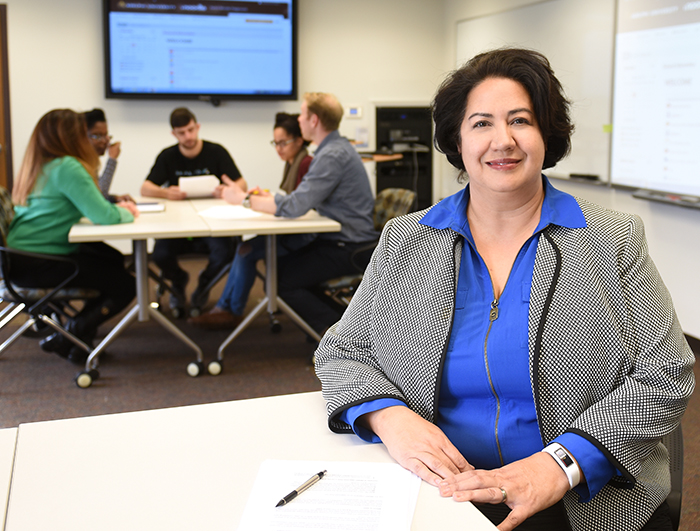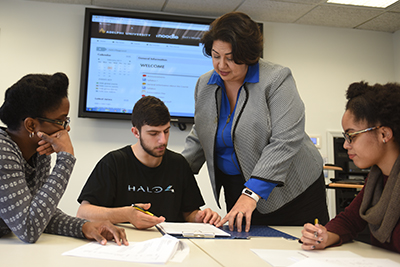Nathalie Zarisfi, Adelphi University's director of the Faculty Center for Professional Excellence, is helping professors find new ways to reach students from diverse learning backgrounds.

In January, Nathalie Zarisfi joined Adelphi University as director of its Faculty Center for Professional Excellence (FCPE). As the leader of Adelphi’s in-house professional development program for faculty, one of her priorities is helping professors find new ways to reach students from diverse learning backgrounds.
She brings with her a wealth of experience from Columbia University, where she worked for almost a decade. Most recently she served as the director of outreach programming at Columbia’s Fu Foundation School of Engineering and Applied Science, where inclusive learning was one of her areas of focus.
She is impressed by the ways that Adelphi helps students from diverse backgrounds and is looking for ways to build on the strong foundation.
Spaces around campus that promote inclusion are among the first things Zarisfi noticed. “One of the ironies is that when we build spaces, usually the architects are consulted first. Adelphi does this differently,” she said. “Students and faculty collaborate on design.” The result, she said, is physical spaces that make conversations easier for students from all backgrounds.
She cited the Gallagher and Hay Labs in Swirbul Library and other “collaboration studios” around campus. “Flexible furniture arrangements, multiple screens, and technology that’s inclusive and collaborative all help remove barriers and help faculty facilitate open and encouraging environments for learners of different ages, social classes, ethnic backgrounds and faith backgrounds,” Zarisfi said.
 But more than just creating spaces for active and open learning, the FCPE helps faculty actually design courses in ways that support diverse learners.
But more than just creating spaces for active and open learning, the FCPE helps faculty actually design courses in ways that support diverse learners.
Zarisfi pointed to a workshop, “Teaching Students With Autism in Higher Education,” taught by Stephen Shore, Ed.D., clinical assistant professor of education, as a perfect case in point. In the workshop, Dr. Shore combines his personal experiences with autism (he himself has autism spectrum disorder) with practical experience working with and supporting students who are on the spectrum.
“We’re not asking professors to modify requirements or curriculum,” Dr. Shore said. “But what is being modified is the manipulation of the information within the course. That’s what has to be addressed and separated.”
Dr. Shore described sensory issues that need to be addressed—noisy or overheated classrooms, fluorescent lights that can seem like strobe lights to students with autism—and ways courses can be reframed. “Most teaching is done orally,” Dr. Shore said, “but for people on the autism spectrum, we may have skills in other areas. Being very visual helps everyone.”
Kinesthetic learning, using movement, can also help students, Dr. Shore said. Not just those on the autism spectrum, but students from all backgrounds. Zarisfi couldn’t agree more.
“When students are physically moving in a space, when they’re not passive, you’re already encouraging participation,” Zarisfi said. “It can be counterintuitive to the ways that we think of teaching.” But that doesn’t bother her. Learning, she says, is the much more important verb. “We’re moving forward and advancing knowledge as a group.”
Zarisfi described other emerging practices that benefit diverse learners and that the FCPE promotes. “One of the strategies that we use is to have students predict or be involved in course content,” she said. “You put together a case study or a simulation, and then you pause and ask students to predict what is going to happen next.” Students vote anonymously, and the results are used for classroom discussion. It’s active learning where everyone participates.
Another practice Zarisfi described is anonymous questioning. Instead of students asking questions aloud, with a microphone and a spotlight, they submit questions anonymously on Google Chat. “It’s much less fraught for some students,” she said. “It levels the playing field.”
With more workshops and trainings to come, Zarisfi is excited about the evidence-based practices Adelphi’s faculty are able to share with one another. “Faculty have a chance not only to check off what they’re already doing. They have a chance to hear from master teachers and be part of a community of practice.”
And that community of practice in turn benefits all of Adelphi’s students, whatever their learning background.
For further information, please contact:
Faculty Center for Professional Excellence (FCPE)
Alumnae Hall, Room 123
p – 516.877.4220
e – fcpe@adelphi.edu